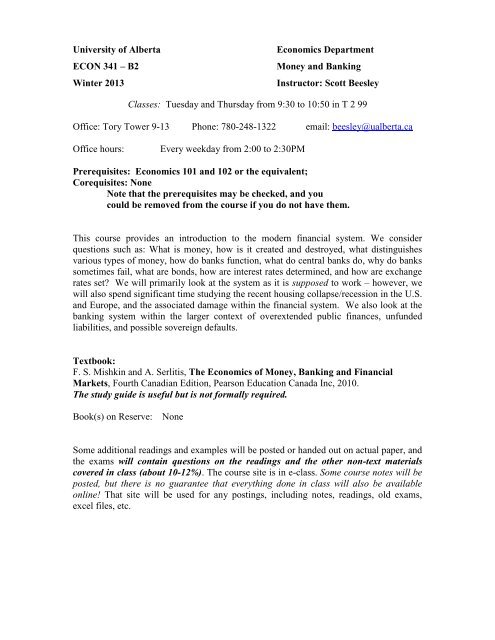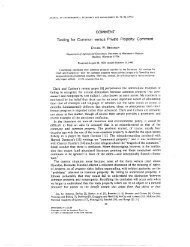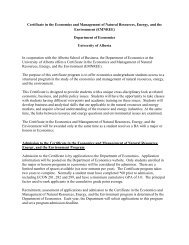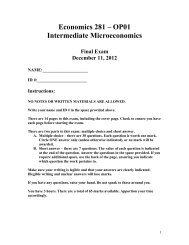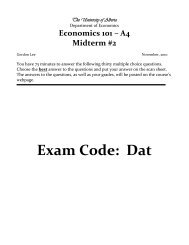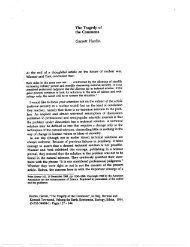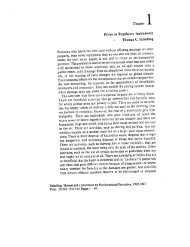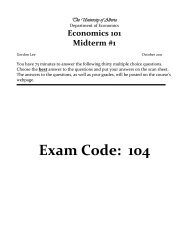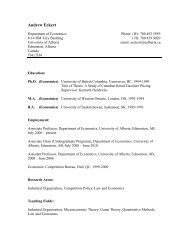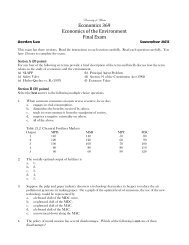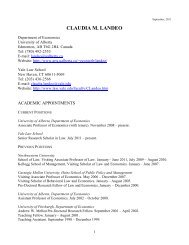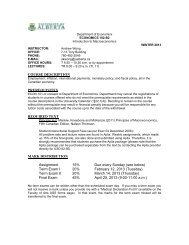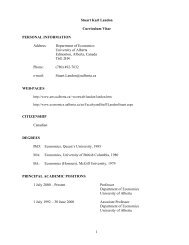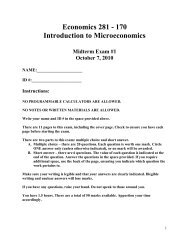341B2 - University of Alberta
341B2 - University of Alberta
341B2 - University of Alberta
Create successful ePaper yourself
Turn your PDF publications into a flip-book with our unique Google optimized e-Paper software.
<strong>University</strong> <strong>of</strong> <strong>Alberta</strong><br />
ECON 341 – B2<br />
Winter 2013<br />
Economics Department<br />
Money and Banking<br />
Instructor: Scott Beesley<br />
Classes: Tuesday and Thursday from 9:30 to 10:50 in T 2 99<br />
Office: Tory Tower 9-13 Phone: 780-248-1322 email: beesley@ualberta.ca<br />
Office hours:<br />
Every weekday from 2:00 to 2:30PM<br />
Prerequisites: Economics 101 and 102 or the equivalent;<br />
Corequisites: None<br />
Note that the prerequisites may be checked, and you<br />
could be removed from the course if you do not have them.<br />
This course provides an introduction to the modern financial system. We consider<br />
questions such as: What is money, how is it created and destroyed, what distinguishes<br />
various types <strong>of</strong> money, how do banks function, what do central banks do, why do banks<br />
sometimes fail, what are bonds, how are interest rates determined, and how are exchange<br />
rates set We will primarily look at the system as it is supposed to work – however, we<br />
will also spend significant time studying the recent housing collapse/recession in the U.S.<br />
and Europe, and the associated damage within the financial system. We also look at the<br />
banking system within the larger context <strong>of</strong> overextended public finances, unfunded<br />
liabilities, and possible sovereign defaults.<br />
Textbook:<br />
F. S. Mishkin and A. Serlitis, The Economics <strong>of</strong> Money, Banking and Financial<br />
Markets, Fourth Canadian Edition, Pearson Education Canada Inc, 2010.<br />
The study guide is useful but is not formally required.<br />
Book(s) on Reserve: None<br />
Some additional readings and examples will be posted or handed out on actual paper, and<br />
the exams will contain questions on the readings and the other non-text materials<br />
covered in class (about 10-12%). The course site is in e-class. Some course notes will be<br />
posted, but there is no guarantee that everything done in class will also be available<br />
online! That site will be used for any postings, including notes, readings, old exams,<br />
excel files, etc.
Course Structure:<br />
Introduction (Chapters 1, 2 and 3)<br />
Financial Markets (Chapters 4, 5, 6, and 7)<br />
Financial Institutions (Chapters 8, 9, 10 and 12)<br />
The Management <strong>of</strong> Financial Institutions (Chapter 13)<br />
Central Banking and the Conduct <strong>of</strong> Monetary Policy (Chapters 15, 16, 17 and 18)<br />
International Finance (Chapter 19 and part <strong>of</strong> 20)<br />
((plus readings throughout))<br />
Grade Determination<br />
Assignment: 20% There is a 1,300 word (maximum) assignment, due on March 28 by<br />
the end <strong>of</strong> the class. Papers can still be handed or emailed in later, but will lose 25% per<br />
time period, as follows: A paper received later on the 28 th gets marked with the rest, then<br />
that mark is multiplied by 0.75. For the 29 th , the factor is 0.50, the 30 th , 0.25, and zero<br />
thereafter. You should ensure that you receive an email from me confirming that I have<br />
received your assignment, if you send it late via email!<br />
Note that you cannot merely email me a paper by the end <strong>of</strong> class – that will be hit<br />
with the 25% discount. I want a paper copy handed to me in the room!<br />
I want you to pick one bank, investment bank, brokerage or rating agency and describe<br />
that entity’s history over the last three to five years (i.e. over the period during which the<br />
U.S. housing bubble peaked and then collapsed). I will provide a list <strong>of</strong> the variables and<br />
factors you might possibly cover (but you don’t have to hit them all!). You should<br />
provide a bibliography <strong>of</strong> some sort, but I am not picky about format. (The bibliography<br />
does not count towards the word count limit!)<br />
Midterm I: 20%, Midterm II: 20%, Final Exam: 40% (the final will be<br />
cumulative, but more heavily weighted (60%) to the material studied after Mid II)<br />
The first midterm covers chapters 1 to 7 (+ readings) and will be on February 5.<br />
The second midterm will cover 8, 9, 10, 12, 13 and 15 (+ readings), and will be held on<br />
March 14. The midterms will be one hour long and will start at the usual class time.<br />
The final is tentatively scheduled for April 22 at 9:00 AM (but you must check the date,<br />
time and place later!!).<br />
Note that as <strong>of</strong> the Fall 2010 term, the use <strong>of</strong> multiple-choice exams was significantly<br />
reduced in this course.
Missed exams:<br />
1) Note that the <strong>University</strong> has made a change to the policy regarding missed midterm<br />
exams and other term work. Medical notes can no longer be required, in the event <strong>of</strong><br />
such missed work. The student may choose to provide a Medical Declaration Form, but<br />
again, that is not a requirement. HOWEVER, the instructor will still have some discretion<br />
as to whether or not the work will be made up, or the weight transferred to the final exam.<br />
Instructors may also require documentation regarding missed work in some cases. Refer<br />
to section 23.4(3) <strong>of</strong> the Calendar.<br />
2) If you miss the final exam for a valid medical reason or severe domestic affliction, you<br />
may apply to the Faculty <strong>of</strong> Arts for the privilege <strong>of</strong> a re-write. Please refer to section<br />
23.5.6 <strong>of</strong> the <strong>University</strong> Calendar for the proper procedure. The Faculties <strong>of</strong> Arts and<br />
Science require that the student complete a Statutory Declaration for in support <strong>of</strong> their<br />
request for a deferred final.<br />
Behavior and ethics<br />
Students should know the university’s Code <strong>of</strong> Student Behaviour and abide by it (see<br />
below). You are advised to read section 30.3.2 on “Inappropriate Academic Behavior” in<br />
particular. I do not tolerate loud talking in class, the use <strong>of</strong> phones etc., and will kick you<br />
out <strong>of</strong> class after one warning.<br />
Code <strong>of</strong> Conduct<br />
“Policy about course outlines can be found in ' 23.4(2) <strong>of</strong> the <strong>University</strong> Calendar.”<br />
(GFC 29 SEP 2003).<br />
“The <strong>University</strong> <strong>of</strong> <strong>Alberta</strong> is committed to the highest standards <strong>of</strong> academic integrity<br />
and honesty. Students are expected to be familiar with these standards regarding<br />
academic honesty and to uphold the policies <strong>of</strong> the <strong>University</strong> in this respect. Students are<br />
particularly urged to familiarize themselves with the provisions <strong>of</strong> the Code <strong>of</strong> Student<br />
Behaviour (online at www.ualberta.ca/secretariat/appeals.htm) and avoid any behaviour<br />
which could potentially result in suspicions <strong>of</strong> cheating, plagiarism, misrepresentation <strong>of</strong><br />
facts and/or participation in an <strong>of</strong>fence. Academic dishonesty is a serious <strong>of</strong>fence and can<br />
result in suspension or expulsion from the <strong>University</strong>.” (GFC 29 SEP 2003)<br />
The General Office<br />
"Dept <strong>of</strong> Economics General Office is CLOSED FROM 12-1 PM"<br />
Good luck.


